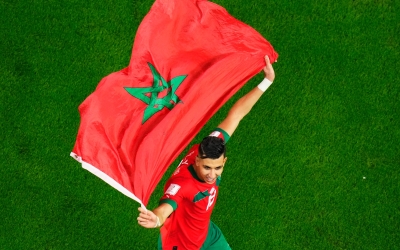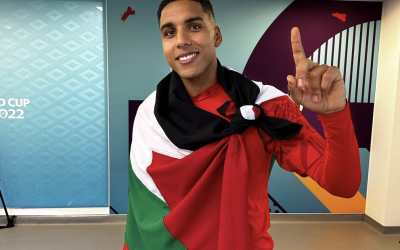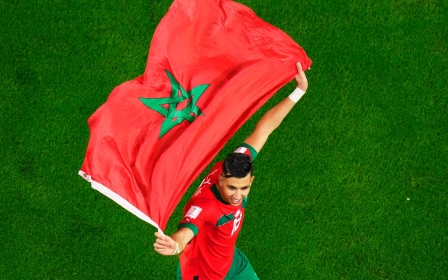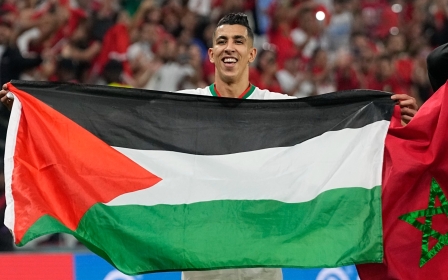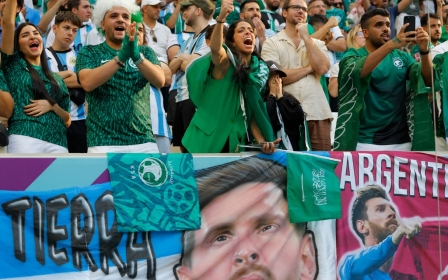Why ‘soft Arabism’ is thriving in Qatar’s World Cup
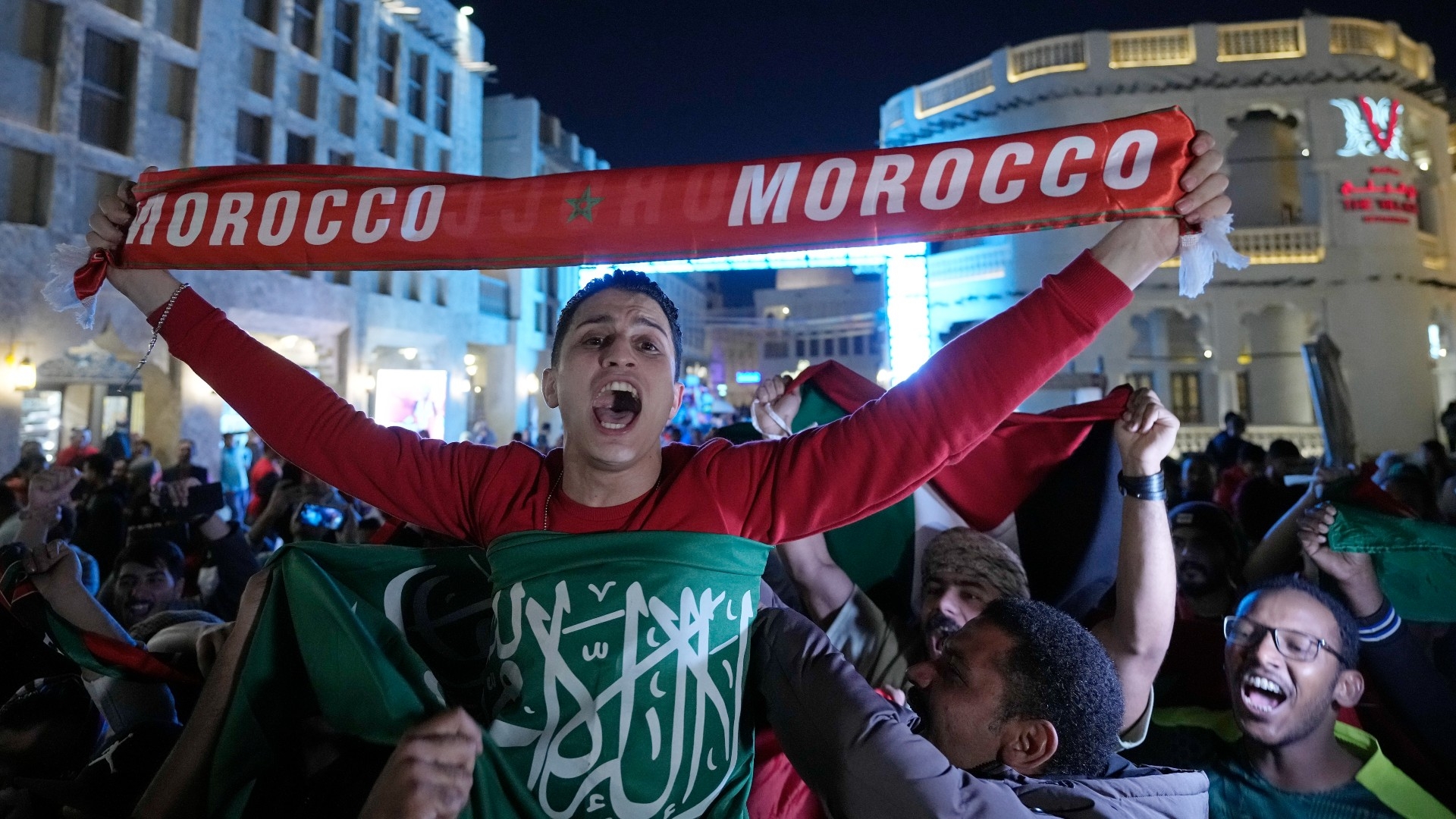
Qatar’s World Cup has been showing impressive collective Arab sport solidarity. Whether in Doha’s stadiums and fan zones or across the Arab region, individual Arab teams were greatly supported in a manner that apparently goes beyond mere football passion.
It is as though all political conflicts, state-to-state disputes and disagreements have been put on hold, allowing for brief moments of Arabism and unity to surface.
When an Arab team plays, Arab fans, regardless of their state-nationalism, gear up to rally behind that team
Yemenis supported the Saudi team regardless of the conflict in their country where Saudi Arabia has been the main player and, for some, guilty of war crimes; Algerians waved Moroccan flags in support of the team despite the bitter conflict between the two countries over Western Sahara; Gulf fans backed Qatar’s team even though the political atmosphere is still tense because of the legacy of the blockade on Qatar by some of its neighbours.
When an Arab team plays, Arab fans, regardless of their state nationalism, gear up to rally behind that team. The significance of these euphoric moments is undoubtedly linked to the specific occasion of the World Cup as a passing event, and tensions and frictions amongst the Arab states will continue for the foreseeable future.
Yet, it is intriguing to observe the recurrence and persistence of forms of pan-Arab sentiment and solidarity, from the highly politicised ones that we saw during the 2010-2011 Arab uprisings, or those in support of Palestine and the Palestinians, to the much softer forms that have been displayed in this World Cup.
Pan-Arab unity in football
Shades of "Arabism" have always changed and stirred debates. In a course that I teach on Arab political ideologies, I ask my students to differentiate between what I call "hard Arabism" and "soft Arabism". The Arab presence and reactions to the World Cup in Qatar are expressions of the latter.
With a small group of my students, in Doha, we initiated a short research project in which we interviewed a random sample of Arab football fans, asking them straightforward questions about why they support this or that Arab team. These interviews are still being conducted as I write but the general line of answers is the same: because I’m an Arab, I support all Arab teams passionately and regardless of any other issue.
The improved performance of Arab teams compared to previous World Cups has contributed to a mood of support and pride. In particular, Morocco’s team and its flags are everywhere in town because the squad has brilliantly made it to the semi-finals, beating Belgium, Spain and Portugal on their journey.
On 27 November, we visited a crowded restaurant where Sameer, a 36-year-old Lebanese man, and his friends were enthusiastically cheering for Morocco which went on to defeat Belgium 2-0.
Asked why he and his friends supported Morocco, Sameer thought it was an odd question. "It's only natural that as an Arab I would support Morocco," he said. Moving around tables and asking the same question to fans from Egypt, Jordan, and Tunisia, the answers were almost identical: "I’m an Arab so, of course, I would (some said I should) support all Arab teams."
A thrilled Egyptian man was jumping and pumping his fists in the air. I asked him if he would have reacted the same way if the winner were Algeria, hinting at the bitter competition between Egypt and Algeria in regional football where some encounters between the two ended up in ugly scenes in recent years.
He responded instantly: "Yes, and a big yes [at that]. My support would be the same, and I’d support Algeria against any team except Egypt."
During the same match, I spoke to a French man in his early 30s about the pan-Arab support for Morocco and the other Arab teams. I asked him if he would express that same joy for a European team victory against a non-European team. He smiled and said: "I don’t think I would care that much."
On 22 November, I went to a different place to watch the match in which Saudi Arabia beat Argentina 2-1. Though the majority of the fans were not Saudi, the exhilarated crowd from diverse Arab countries became electrified once the win was sealed, and a woman wearing a traditional Palestinian dress began to ululate.
Countless scenes and comments were all around the matches that involved any team of the four participating Arab countries that included Qatar, Tunisia, Saudi Arabia and Morocco.
'Hard' vs 'soft' Arabism
All these expressions of common sentiments among Arab fans stand at odds with the fragmented and hostile intra-Arab politics, or "hard Arabism".
Historically, this hard Arabism refers to grand political projects of Arab unity as promoted by Egypt’s Gamal Abdel Nasser in the 1950s and 1960s, or by the Arab Ba'ath party of Assad's Syria or Saddam Hussein’s Iraq.
'Soft' Arabism became stronger, ironically, at a time when hard Arabism and collective Arab politics reached a perhaps all-time low
Currently, it denotes a foreign policy assertiveness of individual Arab states trying to outmanoeuvre each other over regional influence and leverage. Mostly, however, experts and academics have long argued that Arab nationalism in its hard ideological form had indeed long died.
Another form of Arab nationalism that I argue still exists, and even strongly occasionally, is "soft Arabism". This Arabism is apolitical in form and functions spontaneously at the level of people rather than political elites, exhibited in culture, entertainment, language, media, sport and other soft areas.
Arab-to-Arab connectedness in these areas has intensified over the past three decades when Arab hard politics was showing further disintegration and rifts.
The rise of soft Arabism is primarily a result of the rise and influence of pan-Arab media. Arab media broadcast of news, drama, entertainment, music, big pan-Arab television hits such as Arab Idol or Arabs Got Talent has indeed helped in cementing common Arab culture.
As a result, soft Arabism became stronger, ironically, at a time when hard Arabism and collective Arab politics reached perhaps an all-time low. Paradoxically, therefore, the two forms of Arabism seem to move in opposite directions within a regional public and media sphere.
The paradox exists, too, in an overlapping dynamic as the fight within or for hard Arabism produces and strengthens soft Arabism.
The role of the media
Yet another aspect of the paradox is centred on the role of the Arab media in creating soft Arabism. Most influential pan-Arab media in news and entertainment are owned by Arab states and the corporations close to them.
Despite not caring politically about this form of Arabism, these states are driven by their fierce competition, targeting Arabic-speaking audiences in the Arab region and beyond. Each state wants to brand itself across the region to stand out against the others.
These media compete in organising and covering pan-Arab events in the areas of Arab culture, Arab music, Arab film, Arab literature, Arab music, and Arab sport, claiming to speak in the name of the Arab and representing their issues.
This race for hard politics amongst rival states by various means has unintentionally increased people-to-people connections in non-political areas. Thus, while Arab states keep trying to score points against each other, an important, if unplanned, outcome has been the strengthening of soft Arabism.
It is difficult to precisely gauge the depth of this form of Arabism, but it could be said that one of its potentials is to keep political possibilities open. Similar unnoticed potentials surprised everyone in the 2010-2011 Arab uprisings at a time when political stagnation and hopelessness were the common impression about the region.
One political pointer on how the potential of soft Arabism could shift to politics and political manifestation is the wide-ranging expressions of support for Palestine and the Palestinians in this World Cup.
Arabs may disagree on various issues but agree on Palestine, and such expressions of solidarity have been impressive to the point where the Brazilian Globo newspaper described Palestine as the 33rd team in the tournament.
At present, soft Arabism looks apolitical in appearance, but in the longer term and at its core, it is indeed political.
The views expressed in this article belong to the author and do not necessarily reflect the editorial policy of Middle East Eye.
This article is available in French on Middle East Eye French edition.
Middle East Eye propose une couverture et une analyse indépendantes et incomparables du Moyen-Orient, de l’Afrique du Nord et d’autres régions du monde. Pour en savoir plus sur la reprise de ce contenu et les frais qui s’appliquent, veuillez remplir ce formulaire [en anglais]. Pour en savoir plus sur MEE, cliquez ici [en anglais].



